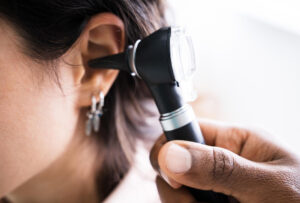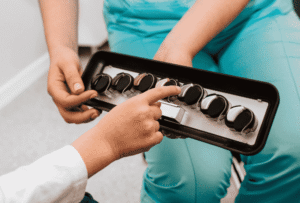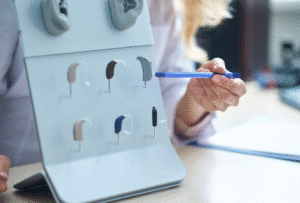Convincing a loved one to use hearing aids can be a difficult process, especially if they aren’t fond of the concept. Financial issues, personal reasons, and misconceptions might leave them unenthusiastic about the idea. Here are some ways to persuade them into trying hearing aids.
Convincing a loved one to use hearing aids can be a difficult process, especially if they aren’t fond of the concept. Financial issues, personal reasons, and misconceptions might leave them unenthusiastic about the idea. Here are some ways to persuade them into trying hearing aids.
Relatives of people with hearing loss are impacted similarly to the hard of hearing person themselves. While it’s unfair to say they suffer because of their loved one’s condition, they do experience unique hardships. Difficulty communicating and concerns with their loved one’s safety are just two of the reasons that someone might ask their relative to get hearing aids. However, the process of endearing them to the idea is a long road, and one that should be taken carefully.
The topic should be handled gently, and you should never push hearing aids onto your family member. This can pressure them into getting hearing aids, which might negatively impact their experience. Hearing aids are meant to benefit them, not you. It is their choice, and while you can nudge them in the direction that might help them, they need to make the step on their own.
That being said, here are some common objections to hearing aids and how to respond to them. By clearing up misconceptions and offering a positive outlook, you can more easily convince people of buying a hearing aid.
“They’re too expensive.”
While hearing aids can become pricey, not all of them are unreasonable. When you consider the size and complexity of the devices, it’s no surprise that they cost a lot to produce properly. However, there are programs in place to help hard of hearing people get the help they need. Talk to your audiologist about this, and don’t hesitate to ask for help affording hearing devices for your loved one.
“I won’t like the way I look.”
Hearing aids don’t have to be noticeably large or clunky. In fact, the technology has improved over the years, making them sleeker and more refined. Many models can be easily hidden behind the ear and come in skin or hair tones to help them blend in with the person´s skin or hair. If camouflage isn’t their preference, unique color palettes can let them personalize their hearing aid to their tastes, such as the Signia Styletto Connect.
“I’m doing just fine without them.”
Just like wheelchairs and prosthetics, hearing aids have a limit to how much they can help. Even if the person can survive without them, it doesn’t mean they aren’t worth using. Hearing aids aren’t meant to solve hearing loss or fix all of the wearer’s problems, they’re just supposed to lend a hand. This support can help wearers accomplish tasks easier and leave more time for the things they enjoy.
Hearing aids can reduce fatigue, ease anxiety, and make it easier to cope with day-to-day tasks. Conversations, music, and even regular environments become more enjoyable, and studies show that many people are happier after being fitted with hearing aids.
“I don’t like the sound of my voice through hearing aids.”
This is a common problem for many wearers. Luckily, Signia developed a solution. Own Voice Processing, or OVP, is a specialized technology that identifies the soundpath of their voice. From there, it can separate their voice from the sounds around them and process it differently. This ultra-fast processing happens in real time so their voice sounds more natural and familiar. https://tape.academy/
If your loved one has recently taken a hearing test and discovered that they’re suffering from hearing loss, it might be time to suggest hearing aids. With proper support and care from family and their HCP, they can begin to enjoy hearing again. To view our wide range of hearing loss devices, visit our website today. Don’t https://effssc.comillaboard.gov.bd/ forget, we also have a handy store locator.









